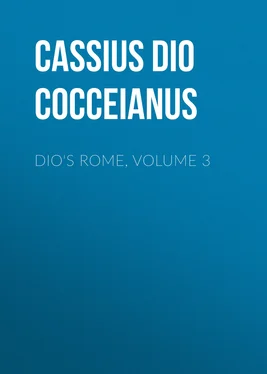Dio Cocceianus Cassius - Dio's Rome, Volume 3
Здесь есть возможность читать онлайн «Dio Cocceianus Cassius - Dio's Rome, Volume 3» — ознакомительный отрывок электронной книги совершенно бесплатно, а после прочтения отрывка купить полную версию. В некоторых случаях можно слушать аудио, скачать через торрент в формате fb2 и присутствует краткое содержание. Издательство: Иностранный паблик, Жанр: foreign_prose, История, foreign_edu, foreign_antique, на английском языке. Описание произведения, (предисловие) а так же отзывы посетителей доступны на портале библиотеки ЛибКат.
- Название:Dio's Rome, Volume 3
- Автор:
- Издательство:Иностранный паблик
- Жанр:
- Год:неизвестен
- ISBN:нет данных
- Рейтинг книги:4 / 5. Голосов: 1
-
Избранное:Добавить в избранное
- Отзывы:
-
Ваша оценка:
- 80
- 1
- 2
- 3
- 4
- 5
Dio's Rome, Volume 3: краткое содержание, описание и аннотация
Предлагаем к чтению аннотацию, описание, краткое содержание или предисловие (зависит от того, что написал сам автор книги «Dio's Rome, Volume 3»). Если вы не нашли необходимую информацию о книге — напишите в комментариях, мы постараемся отыскать её.
Dio's Rome, Volume 3 — читать онлайн ознакомительный отрывок
Ниже представлен текст книги, разбитый по страницам. Система сохранения места последней прочитанной страницы, позволяет с удобством читать онлайн бесплатно книгу «Dio's Rome, Volume 3», без необходимости каждый раз заново искать на чём Вы остановились. Поставьте закладку, и сможете в любой момент перейти на страницу, на которой закончили чтение.
Интервал:
Закладка:
[-5-] In this way he that was formerly called Octavius, but already at this time Caesar, and subsequently Augustus, took charge of affairs and settled them and brought them to a successful close more vigourously than any mature man, more prudently than any graybeard. First he entered the city as if for the sole purpose of succeeding to the inheritance, and as a private citizen with only a few attendants, without any ostentation. Still later he did not utter any threat against any one nor show that he was displeased at what had occurred and would take vengeance for it. So far from demanding of Antony any of the money that he had previously plundered, he actually paid court to him although he was insulted and wronged by him. Among the other injuries that Antony did him by both word and deed was his action when the lex curiata was proposed, according to which the transfer of Octavius into Caesar's family was to take place: Antony himself, of course, was active to have it passed, but through some tribunes he secured its postponement in order that the young man being not yet Caesar's child according to law might not meddle with the property and might be weaker in all other ways. [-6-] Caesar was restive under this treatment, but as he was unable to speak his mind freely he bore it until he had won over the crowd, by whose members he understood his father had been raised to honor. He knew that they were angry at the latter's death and hoped they would be enthusiastic over him as his son and perceived that they hated Antony on account of his having been master of the horse and also for his failure to punish the murderers. Hence he undertook to become tribune as a starting point for popular leadership and to secure the power that would result from it; and he accordingly became a candidate for the place of Cinna, which was vacant. Though hindered by Antony's clique he did not desist and after using persuasion upon Tiberius Cannutius, a tribune, he was by him brought before the populace. He took as an excuse the gift bequeathed by Caesar and in his speech touched upon all the important points, promising that he would discharge this debt at once, and gave them cause to hope for much besides. After this came the festival appointed in honor of the completion of the temple of Venus, which some, while Caesar was alive, had promised to celebrate, but were now holding in, slight regard as they did the horse-race connected with the Parilia; 6 6 See footnote to Book Forty-three, chapter 42.
and to win the favor of the populace he provided for it at his private expense on the ground that it concerned him because of his family. At this time out of fear of Antony he brought into the theatre neither Caesar's gilded chair nor his crown set with precious stones, though it was permitted by decree. [-7-] When, however, a certain star through all those days appeared in the north toward evening, some called it a comet, and said that it indicated the usual occurrences; but the majority, instead of believing this, ascribed it to Caesar, interpreting it to mean that he had become a god and had been included in the number of the stars. Then Octavius took courage and set up in the temple of Venus a bronze statue of him with a star above his head. Through fear of the populace no one prevented this, and then, at last, some of the earlier decrees in regard to honors to Caesar were put into effect. They called one of the months July after him and in the course of certain triumphal religious festivals they sacrificed during one special day in memory of his name. For these reasons the soldiers also, and particularly since some of them received largesses of money, readily took the side of Caesar.
Rumors accordingly went abroad, and it seemed likely that something unusual would take place. This idea gained most headway for the reason that when Octavius was somewhat anxious to show himself in court in an elevated and conspicuous place, as he had been wont to do in his father's lifetime, Antony would not allow it, but had his lictors drag him down and drive him out. [-8-] All were exceedingly vexed, and especially because Caesar with a view to casting odium upon his rival and arousing the multitude would no longer even frequent the Forum. So Antony became terrified, and in conversation with the bystanders one day remarked that he harbored no anger against Caesar, but on the contrary owed him affection, and felt inclined to dispel the entire cloud of suspicion. The statement was reported to the other, they held a conference, and some thought they had become reconciled. As a fact they understood each other's dispositions accurately, and, thinking it inopportune at that time to put them to the test, they came to terms by making a few mutual concessions. For some days they were quiet; then they began to suspect each other afresh as a result of either some really hostile action or some false report of hostility,—as regularly happens under such conditions,—and were again at variance. When men become reconciled after a great enmity they are suspicious of many acts that contain no malice and of many chance occurrences. In brief, they regard everything, in the light of their former hostility, as done on purpose and for an evil end. While they are in this condition those who stand on neutral ground aggravate the trouble, irritating them still more by bearing reports to and fro under the pretence of devotion. There is a very large element which is anxious to see all those who have power at variance with one another,—an element which consequently takes delight in their enmity and joins in plots against them. And the party which has previously suffered from calumny is very easy to deceive with words adapted to the purpose by a band of friends whose attachment is not under suspicion. This also accounts for the fact that these men, who did not trust each other previously, became now even more estranged.
[-9-] Antony seeing that Caesar was gaining ground attempted to attract the populace by various baits, to see if he could detach the people from his rival and number them among his own forces. Hence through Lucius Antonius, his brother, who was tribune, he introduced a measure that considerable land be opened for settlement, among the parcels being the region of the Pontine marshes, which he stated had already been filled and were capable of cultivation. The three Antonii, who were brothers, all held office at the same time. Marcus was consul, Lucius tribune, and Gaius praetor. Therefore they could very easily remove those who were temporarily rulers of their allies and subjects (except the majority of the assassins and some others whom they regarded as loyal) and choose others in place of them: they could also grant some the right to hold office for an unusually long term, contrary to the laws established by Caesar. Also Macedonia, which fell to Marcus by lot, was appropriated by his brother Gaius, but Marcus himself with the legions previously despatched into Apollonia laid claim to Gaul on this side of the Alps, to which Decimus Brutus had been assigned; the reason was that it seemed to be very strong in resources of soldiers and money. After these measures had been passed the immunity granted to Sextus Pompey by Caesar, as to all the rest, was confirmed: he had already considerable influence. It was further resolved that whatever moneys of silver or gold the public treasury had taken from his ancestral estate should be restored. As for the lands belonging to it Antony held the most of them and made no restoration.
[-10-] This was the business in which they were engaged. But I shall now go on to describe how Sextus had fared. When he had fled from Corduba, he first came to Lacetania and concealed himself there. He was pursued, to be sure, but eluded discovery through the fact that the natives were kindly disposed to him out of regard for his father's memory. Later, when Caesar had started for Italy and only a small army was left behind in Baetica, he was joined both by the native inhabitants and by those who escaped from the battle, and with them he came again into Baetica, because he thought it more suitable for the carrying on of war. There he gained possession of soldiers and cities, particularly after Caesar's death, some voluntarily and some by violence; the commandant in charge of them, Gaius Asinius Pollio, held a force that was far from strong. He next set out against Spanish Carthage, but since in his absence Pollio made an attack and did some damage, he returned with a large force, met his opponent, and routed him. After that the following accident enabled him to startle and conquer the rest, as well, who were contending fiercely. Pollio had cast off his general's cloak, in order to suffer less chance of detection in his flight, and another man of the same name, a brilliant horseman, had fallen. The soldiers, hearing the name of the latter, who was lying there, and seeing the garment which had been captured, were deceived, and thinking that their general had perished surrendered. In this way Sextus conquered and held possession of nearly that entire region. When he was now a powerful factor, Lepidus arrived to govern the adjoining portion of Spain, and persuaded him to enter into an agreement on condition that he should recover his father's estate. Antony, influenced by his friendship for Lepidus and by his hostility toward Caesar, caused such a decree to be passed.
Читать дальшеИнтервал:
Закладка:
Похожие книги на «Dio's Rome, Volume 3»
Представляем Вашему вниманию похожие книги на «Dio's Rome, Volume 3» списком для выбора. Мы отобрали схожую по названию и смыслу литературу в надежде предоставить читателям больше вариантов отыскать новые, интересные, ещё непрочитанные произведения.
Обсуждение, отзывы о книге «Dio's Rome, Volume 3» и просто собственные мнения читателей. Оставьте ваши комментарии, напишите, что Вы думаете о произведении, его смысле или главных героях. Укажите что конкретно понравилось, а что нет, и почему Вы так считаете.












